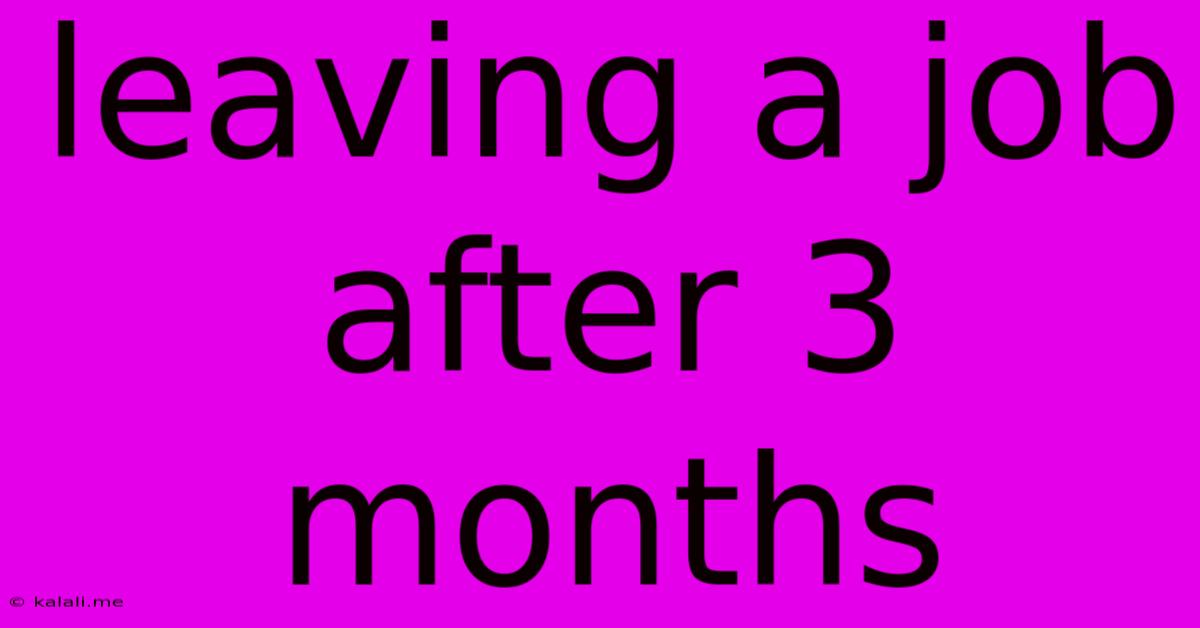Leaving A Job After 3 Months
Kalali
Jun 09, 2025 · 3 min read

Table of Contents
Leaving a Job After 3 Months: A Guide to Navigating a Difficult Situation
Leaving a job after only three months is a delicate situation. It can feel awkward, raise eyebrows, and potentially impact your future career prospects. However, sometimes circumstances necessitate a quick exit, whether due to unforeseen issues, a poor fit, or a toxic work environment. This guide will help you navigate this challenging situation gracefully and professionally.
Why You Might Leave After 3 Months: Several factors can lead to a short tenure. Understanding your reasons is crucial for crafting your resignation and future job search strategy. Common reasons include:
- Mismatched Expectations: The job description or interview process may have misrepresented the role's responsibilities or company culture. This is a common reason for early departures and is often understandable to employers.
- Toxic Work Environment: A hostile, unsupportive, or even abusive work environment can make a job untenable, regardless of salary or initial appeal. Prioritizing your mental and emotional wellbeing is paramount.
- Lack of Growth Opportunities: If the role lacks the promised challenges or opportunities for professional development, it might be time to move on.
- Health Concerns: Personal health issues, or the impact of a stressful work environment on your health, can make continuing employment impossible.
- Better Opportunity: A significantly better offer might present itself, making a quick departure necessary.
How to Resign Professionally: Even though your tenure is short, professionalism is crucial. Here's how to handle your resignation:
- Submit a Formal Resignation Letter: A written resignation is always preferred. Keep it brief, professional, and express gratitude for the opportunity. Avoid detailing your reasons for leaving. A simple statement like, "I am writing to inform you of my resignation, effective [Date]," is sufficient.
- Speak to Your Manager in Person (if possible): While a formal letter is necessary, a face-to-face conversation allows for a more personal, although brief, discussion. Express your gratitude for the opportunity and maintain a positive tone.
- Offer to Help with the Transition: Depending on your relationship with your manager and the nature of your departure, offering to assist with training your replacement can demonstrate professionalism and goodwill.
- Keep it Concise and Positive: Avoid negativity or lengthy explanations. Focus on the facts and express your appreciation for the experience.
Addressing the "Why" in Future Job Interviews: Leaving a job after such a short period will likely be addressed in future interviews. Here's how to tackle this sensitive topic:
- Be Honest (But Concise): Briefly explain the situation without dwelling on the negatives. Focus on the mismatch of expectations or the unforeseen circumstances. For example, "While I appreciated the opportunity at [Previous Company], I quickly realized the role wasn't the right fit for my long-term career goals." or "Due to unforeseen circumstances, I needed to leave my previous role sooner than anticipated."
- Highlight Your Learnings: Even a short stint can provide valuable insights. Frame your experience in a positive light, highlighting what you learned and how it has prepared you for future roles.
- Focus on the Future: Shift the conversation towards your skills and how they align with the current opportunity. Demonstrate your enthusiasm for the new role and your commitment to long-term success.
- Avoid Badmouthing Your Previous Employer: Maintaining professionalism is critical. Negative comments reflect poorly on you, not your former employer.
Moving Forward: Leaving a job after three months can be challenging, but it doesn't have to define your career. By handling the situation professionally, being honest (yet concise) in future interviews, and focusing on your future goals, you can successfully navigate this experience and move on to a more fulfilling and suitable role. Remember to focus on your next steps, learn from this experience, and highlight your transferable skills in your future job applications. Your career journey is a marathon, not a sprint.
Latest Posts
Latest Posts
-
Sin Is Crouching At The Door
Jun 09, 2025
-
How To Undo A Rounded Bolt
Jun 09, 2025
-
Wifi Does Not Have An Ip Address
Jun 09, 2025
-
How To Unscrew A Tiny Screw Without A Screwdriver
Jun 09, 2025
-
How To Use Tv As Second Monitor
Jun 09, 2025
Related Post
Thank you for visiting our website which covers about Leaving A Job After 3 Months . We hope the information provided has been useful to you. Feel free to contact us if you have any questions or need further assistance. See you next time and don't miss to bookmark.